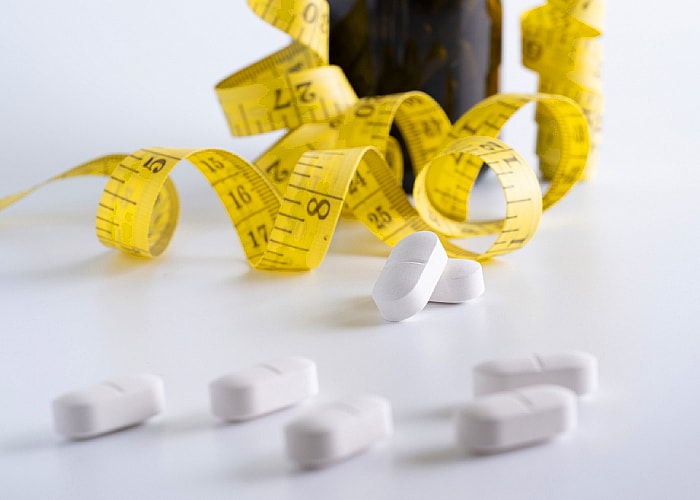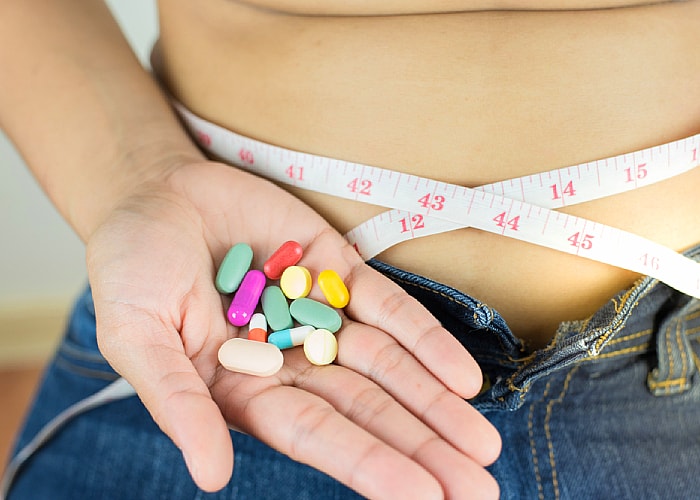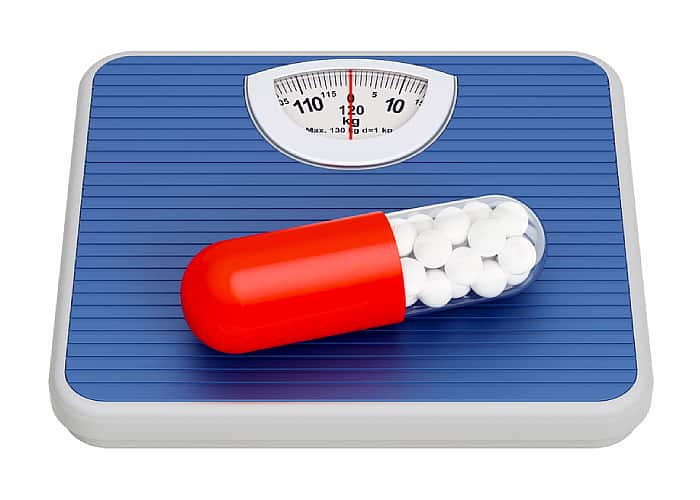What are Diet Pills?
Pronounced as /ˈdaɪət pɪls/
Diet pills or weight loss pills are drugs that are designed to help a person lose weight. The primary function of diet pills is to lower appetite and stimulate physical activity, thus resulting in fat loss and weight loss.
Diet pills are encouraged only for those who are suffering from extreme obesity. Weight loss pills can either be prescribed or bought over the counter. Most of the prescription weight loss pills are classified by the DEA as Schedule III or IV controlled substances.
There are weight loss pills that are synthetically made, but there are also natural weight loss supplements marketed as effective weight loss pills to burn fat and get rid of excess weight.
Some drugs that are not necessarily manufactured for the purpose of losing weight are used as weight loss pills. Some prescription medicines and illicit drugs are often abused because of the weight loss benefits they deliver as a side effect.
Some examples of these drugs that can make people lose weight and act as appetite suppressants during drug use are cocaine, meth, ADHD medications, and other prescription drugs. The problem, however, is that while these drugs can aid you in losing weight and can act as an appetite suppressant, they can also cause more severe consequences like addiction and drug overdose.
What Are the Different Types of Diet Pills?
There are several types of weight loss pills that can make people lose weight, burn stubborn body fat, and curb their appetite.
Anorexiants
These types of weight loss pills are also known as anorectics, anorexics, or anorexigenic. These diet pills target the brain by acting as an appetite suppressant while stimulating physical activity.
Stimulants
These weight loss pills are central nervous system-enhancing drugs that can be prescription diet pills or over-the-counter (OTC) diet pills. The main effect is to act as an appetite suppressant while increasing physical and mental activity.
Since stimulant weight loss pills are typically prescribed only to obese patients, people who want to lose weight quickly often find it easier to turn to illicit stimulants like cocaine or meth.
Lipase inhibitors
These weight loss pills are enzymes that inhibit fat absorption. This can help people who need or want to lose belly fat, burn stubborn belly fat, burn fat, and decrease stored fat in the body.
Laxatives
These weight loss pills are not typically advertised as weight loss pills but are commonly abused by consumers when losing weight. A laxative may act as an effective weight loss supplement because it can induce bowel movements, emptying the stomach faster, and resulting in weight loss. The problem is that too many laxatives are not safe and could result in side effects.
Natural Dietary Supplements
These types of weight loss pills are also known as natural diet pills, natural weight loss pills, diet supplement, and natural weight loss drugs. These natural supplements come in the form of tablets, pills, tea, powdered drinks, and juices.
Natural diet pills are marketed as having only natural ingredients, thus suggesting that something natural should be safe and effective weight loss supplements to use. Green tea is an example of a diet supplement that is natural and beneficial when taken as part of a healthy diet.
However, not all of these natural weight loss pills or drinks are regulated, meaning there may not be proof or evidence to back the claim that a natural diet supplement can be an effective weight loss pill. Lack of scientific backing does not stop the use of dietary supplements as popular weight loss pills.
What Do Diet Pills Look Like?
Prescription and OTC weight loss pills are often sold in capsule or tablet form in the market. Typically, popular weight loss pills have a pill imprint of the brand name and the strength or drug content. Most weight loss pills also come in different colors depending on the brand name of the weight loss pill.
But not all weight loss supplements come in pill or tablet form. You can also find many weight loss supplements in the form of powdered drinks, juices, tea, and coffee. There are even dietary supplements that are added to food items like candy, biscuits, or sugar-free packaged food.
What Are the Other Names of Diet Pills?
There is no single diet pill in the market as there can be several manufacturers, drug types, and brand names of diet pills and weight loss supplements available. Below is a list of some of the top weight loss pills commonly used in the United States.
Prescription Weight Loss Drugs (FDA-Approved)
- Orlistat: Brand Names – Alli, Xenical
- Lorcaserin: Brand Name - Belviq
- Phentermine and Topiramate: Brand Name –Qsymia
- Naltrexone-bupropion: Brand Name – Contrave
- Liraglutide: Brand Name – Saxenda
- Phentermine
- Benzphetamine
- Diethylpropion
- Phendimetrazine
Herbs and Supplements Lose Body Weight
- Garcinia cambogia
- Glucomannan
- Conjugated linoleic acid (CLA)
- Raspberry ketones
- Forskolin
- Chromium
- Green tea extract
- Bee pollen
- Green coffee beans / green coffee bean extract
What Are the Street Names of Diet Pills?
The street names of a specific diet pill will depend on the specific brand name of the drug. Below is a list of the common street names used for weight loss drugs when sold on the streets.
- laxatives
- fen-phen
- phen-fen
- fen-dex
What Are Diet Pills Used For?
Diet pills are used for many different purposes but as the name suggests, the main purpose is to lose body weight. Here are some of the common uses of weight loss supplements and pills.

Treat Obesity
Diet pills are a type of medication used to help people who struggle with obesity lose weight. A weight loss pill works by helping to reduce hunger, calorie intake, and cravings. Diet pills can also aid in increasing energy levels, lower blood sugar levels, and decreasing the amount of fat absorbed in the body. Taking a weight loss pill as prescribed by a doctor can lead to significant weight loss and fat loss over time.
Suppress Appetite
Diet pills are often taken to act as appetite suppressants, allowing individuals to better manage their calorie intake and feel more satisfied with smaller portions of food. Some of the natural ingredients found in diet pills like herbs and other plant extracts are designed to make you feel full faster. Additionally, these weight loss supplements can also give your body the nutrients it needs while helping control calorie and fat intake.
Reduce Body Mass Index (BMI)
Weight loss supplements can also be used to lower a person's body mass index or BMI. This is a measurement of how much body fat someone has relative to their height. A person with a higher BMI is considered overweight and may be at increased risk for certain health issues. With an effective weight loss supplement combined with a healthy diet and exercise, a person's BMI can decrease without losing lean muscle mass, reducing the risk associated with being overweight or obese.
Boost Metabolism
Taking certain types of weight loss supplements can help to boost metabolism as well, which can lead to weight loss over time. When your metabolism is running efficiently, it’s easier for your body to convert stored fat into energy instead of storing the excess fat away for later use. Some diet pills even contain a combination of ingredients that work together to increase the metabolic process and burn off more calories quickly.
Control Food Cravings
Food cravings are often the reason why people cannot stick to a healthy eating plan or lose weight in general. A weight loss supplement may not only suppress appetite but also reduce cravings by providing essential minerals that curb hunger pangs naturally and prevent weight gain. The active ingredients work together on a cellular level to help balance hormones, such as leptin and ghrelin, that regulate food intake so you don’t feel the need to binge or overeat when you’re feeling hungry.
Burn Fat More Quickly
Finally, some diet pills may contain stimulant properties that act as fat burners. A fat-burning weight loss supplement is often designed to support the metabolic processes used by our bodies to burn fat quickly when combined with regular exercise and a healthy low-fat diet. A fat burner is typically used by people who want to get rid of hard-to-lose fat like belly fat or those without a healthy fat metabolism. These people usually take a fat burner when exercise or a healthy diet alone does not work for them to lose body fat.
How Do Diet Pills Work?
The mechanism of how a certain weight loss pill works primarily depends on its type. For instance, an anorexiant type of weight loss pill works by targeting the brain and suppressing it from feeling hungry or craving food.
Stimulant types work almost the same way as the first one but it has the added factor of enhancing physical alertness, mental activity, and metabolism.
Meanwhile, lipase inhibitor types work by inhibiting lipase in the pancreas from metabolizing and absorbing fats from the food we eat. This can result in fat burning and fat loss. Laxatives work by treating constipation and inducing bowel movement.
How Strong Are Diet Pills?
The strength of a weight loss drug is dependent on its type and brand. Typically, prescription medicines specifically for losing weight and obesity are the best weight loss supplements compared to natural counterparts.
A prescription weight loss medication can cut down 3 to 10 percent of a patient’s body weight at the start of the session. Some popular weight loss supplements may claim that they can help you lose weight quicker, but without proper medical advice, they may cause severe side effects.
Illicit weight loss pills such as methamphetamines and cocaine are the strongest drugs that can contribute to shedding body weight quickly. Some studies also suggest that drugs like cocaine can even alter a person's fat cells and normal fat metabolism. However, while these drugs can rapidly make a person lose body weight or body fat, these drugs are very dangerous and could result in addiction and drug overdose.
How Long Do Diet Pills Stay in Your System, Blood, Urine, Saliva, Hair?
The general active component found in most weight loss medicines is phentermine. This chemical substance is naturally derived from a monoamine alkaloid. It is a sympathomimetic stimulant with a primary function of suppressing appetite. This substance has comparable effects to amphetamines.
If you are to undergo a drug test, you may be wondering how long this drug stays in your system. Again, the duration is different depending on the type of drug but to give you an idea, a weight loss supplement or drug containing phentermine can be detected in your system in the following duration:
Blood test: 24 hours
Urine test: 1-4 days
Hair test: 1 month
Saliva test: Not applicable
How Does One Get Addicted to Diet Pills?
Diet pills can be helpful when used as prescribed by a medical professional and in combination with exercise and a low fat diet. However, abusing even the best weight loss pills can give negative consequences.
Most weight loss medications have been classified by the DEA as Schedule III and IV controlled substances. The general components for most weight loss medicines have moderate to low addictive potential.

A lot of times, people who want to lose weight use diet pills, fat burners, and other herbal products. When they start seeing initial results like getting rid of excess weight or losing stubborn body fat, they become psychologically dependent on the drug and are reluctant to stop taking it. They may increase their dosage without consulting a doctor to increase the weight loss and fat burning benefits of what they're taking. A person who is already prone to addiction may be more likely to become addicted to diet pills than someone who isn’t.
Furthermore, if you use illicit drugs like meth, cocaine, or other amphetamine-containing drugs to burn fat and help you lose weight, these drugs can be highly addictive and cause withdrawal symptoms.
What Are the Side Effects of Diet Pills?
Aside from the general effect of losing body weight, fat burning, and suppressing appetite, there are other short-term and long-term side effects associated with the use of these weight loss pills.
Short-term effects:
- Dizziness
- Tingling sensation
- Constipation
- Dry mouth
- Headache
Long-term effects:
- High blood pressure
- Irregular sleeping pattern
- Anxiety
- Uncontrolled body shaking
- Dysfunctional taste buds

Why Are Diet Pills Dangerous?
Drugs that help you lose weight often pose moderate to low addictive potential, except for highly addictive illicit drugs (meth cocaine, stimulants, etc.) that are not designed for weight loss.
Generally, the severity of side effects is dependent on the type of drug, dosage, and frequency of usage. Below are some of the dangers of abusing weight loss medications.
Substance Abuse
Even the best weight loss supplements can be dangerous when abused. If you are overweight and you know that you need to lose weight to be healthy, it's best to consult a doctor because self-medicating can put you at risk of drug abuse. Depending on the drug you are taking to help you lose weight, you can easily get addicted without knowing it.
Drug Overdose
Diet pills are intended for short-term usage (approximately 12 weeks). Taking too many drugs to help you lose weight can result in an overdose especially if you're taking stimulants or prescription medications. It is best to consult your doctor or any medical personnel to seek proper prescription, dosage, and frequency of administration.
Mixing With Other Drugs
It's not uncommon for people on a weight loss journey to use substances like alcohol, antidepressants, or painkillers while also taking diet pills simultaneously. Depending on the combination of substances, mixing diet pills with a cocktail of drugs can be dangerous.
Fake Diet Pills
Perhaps you have seen advertisements marketing the best diet pills, best weight loss supplement, or best weight loss pills and fat burner. You get easily swayed by the claims even if you're not sure whether they are truly effective. The danger with these drugs is that if they are not FDA-approved for weight loss or recommended by a medical professional, they may not actually have any weight loss or fat-burning benefit. You may be taking a fake diet pill or fat burner that does not really help your weight loss journey. Worse, these fake "best diet pills" could even contain
What Causes Diet Pill Overdose?
When it comes to determining the number of diet pills someone should take daily, there is no one-size-fits-all approach. The dose must be tailored according to individual factors, making it important for each person to consult a medical professional before starting any new medication regimen.
Here are some possible reasons for overdose:
- Excessive intake of prescription weight loss pills than what is prescribed by the medical personnel
- Administering prescription weight loss drugs not suitable for normal weight or underweight
- Self-medication with a prescription weight loss drug
- Taking in combinations of various prescription weight loss pills
- Taking in prescription weight loss pills with illicit substances

What Are the Signs of Overdose?
Here are the following common signs and symptoms for a person experiencing an overdose of weight loss pills:
- Gastrointestinal problems
- Rapid heartbeat
- Changes in blood pressure
- Dry mouth and dehydration
- Constipation
- Difficulty to urinate
- Uncontrolled mood change
How Do You Treat Overdose?
If you suspect that someone is experiencing a weight loss pill overdose, it is important to seek medical attention immediately. The doctor will assess the individual and provide appropriate treatment based on the severity of the symptoms.
This can include supportive care, oxygen therapy, and monitoring of vital signs like heart rate and blood pressure. In some cases, medications may be administered to reduce the effects of the overdose or counteract its effects.
What Are the Withdrawal Symptoms from Diet Pills?
If the weight loss drug you are taking has a high addictive potential, withdrawal symptoms may occur after a few hours after the last dose of the weight loss pill was last taken. These symptoms may last for a week but some may continue to experience symptoms after a few months.
- Fatigue
- Brain fog
- Rapid weight gain
- Easily irritated
- Unstable mood
How Can You Treat Diet Pill Addiction?
Diet pill abuse and addiction are treatable. A comprehensive treatment approach can help manage the physical and psychological symptoms of addiction. Treatment should include medically supervised detoxification, counseling, therapy, lifestyle interventions, and support networks.
It is important to monitor your diet pill usage even with FDA-approved medications as taking too much can be dangerous. To avoid overdosing on diet pills, make sure you carefully follow all directions provided by your doctor.





